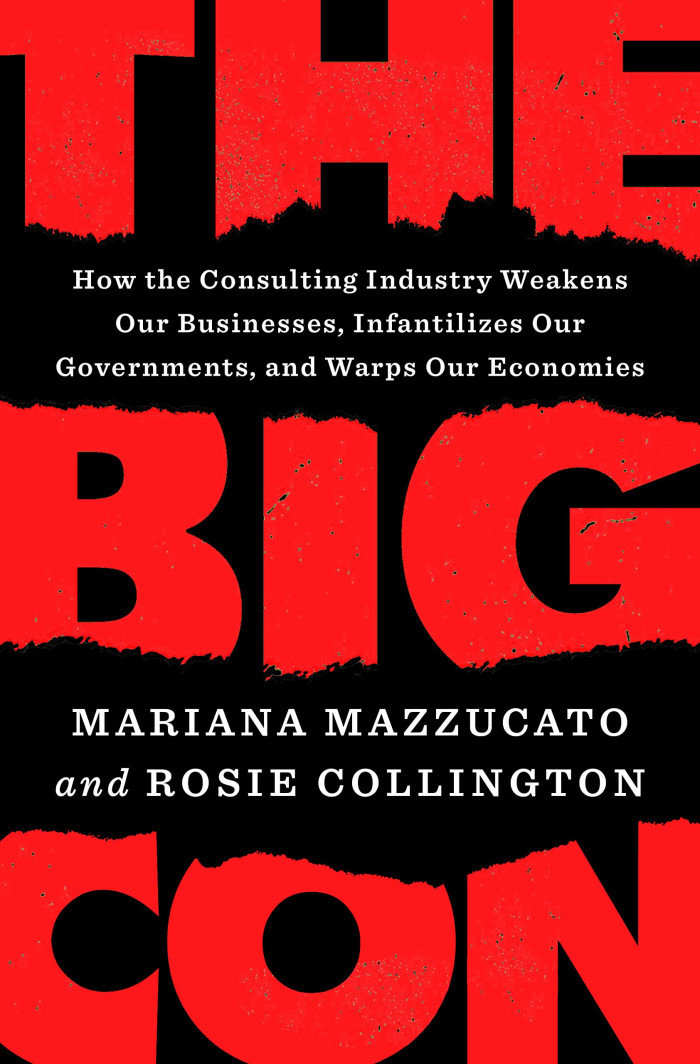
Support the author by purchasing this book with the link below!
PurchaseThe Big Con
Mariana Mazzucato and Rosie Collington
Published: 2023
In their book titled "The Big Con: Rethinking the Role of Consulting," Mariana Mazzucato and Rosie Collington present a critical examination of the consulting industry and its impact on modern business and government practices. They argue that the entrenched relationship between consulting firms and the entities they serve, including McKinsey & Company, Boston Consulting Group, and others, has detrimental effects on innovation, accountability, and the urgent need to address the climate crisis.
The authors describe the consulting industry as a confidence trick, which has flourished since the 1980s and 1990s under neoliberal and Third Way reforms. They highlight how these firms leverage their extensive networks and advisory roles to secure lucrative contracts, presenting themselves as objective sources of expertise. However, Mazzucato and Collington contend that this reliance on consultants undermines businesses, infantilizes governments, and distorts economies.
"The Big Con" explores prominent case studies to underscore their arguments. They analyze the disastrous rollout of the HealthCare.gov website and the inadequate responses to the COVID-19 pandemic as examples of consultants assuming decision-making responsibilities with dire consequences. Through peerless scholarship and original research, the authors unveil the inner workings of the consulting industry, urging a reevaluation of its role in society.
Mazzucato and Collington advocate for a new system that prioritizes the common good and fosters innovative collaboration between the public and private sectors. They emphasize the need to move away from a narrow focus on shareholder value maximization and instead work towards a sustainable and equitable economy. By challenging the notion of consultants as objective experts and calling for greater accountability and transparency, the authors offer a compelling intellectual journey into the heart of the modern economy.
In summary, "The Big Con" serves as a wake-up call, revealing the potential pitfalls of the consulting industry and urging readers to reassess its influence. It calls for a fundamental shift towards a new system that promotes collective progress, innovation, and responsible decision-making to tackle the pressing challenges facing our world today.
The authors describe the consulting industry as a confidence trick, which has flourished since the 1980s and 1990s under neoliberal and Third Way reforms. They highlight how these firms leverage their extensive networks and advisory roles to secure lucrative contracts, presenting themselves as objective sources of expertise. However, Mazzucato and Collington contend that this reliance on consultants undermines businesses, infantilizes governments, and distorts economies.
"The Big Con" explores prominent case studies to underscore their arguments. They analyze the disastrous rollout of the HealthCare.gov website and the inadequate responses to the COVID-19 pandemic as examples of consultants assuming decision-making responsibilities with dire consequences. Through peerless scholarship and original research, the authors unveil the inner workings of the consulting industry, urging a reevaluation of its role in society.
Mazzucato and Collington advocate for a new system that prioritizes the common good and fosters innovative collaboration between the public and private sectors. They emphasize the need to move away from a narrow focus on shareholder value maximization and instead work towards a sustainable and equitable economy. By challenging the notion of consultants as objective experts and calling for greater accountability and transparency, the authors offer a compelling intellectual journey into the heart of the modern economy.
In summary, "The Big Con" serves as a wake-up call, revealing the potential pitfalls of the consulting industry and urging readers to reassess its influence. It calls for a fundamental shift towards a new system that promotes collective progress, innovation, and responsible decision-making to tackle the pressing challenges facing our world today.
1. The consulting industry's relationship with business and government has significant implications for innovation, accountability, and addressing societal challenges.
2. Consulting firms have gained extensive power and influence, but their operations can hinder progress by prioritizing short-term gains and obscuring accountability.
3. The growth of the consulting industry can be traced back to neoliberal and Third Way reforms, which have shaped the current landscape of capitalism.
4. Case studies, such as the HealthCare.gov rollout and pandemic responses, illustrate the potential pitfalls of relying heavily on consultants for decision-making.
5. The authors advocate for building a new system where public and private sectors collaborate for the common good, prioritizing long-term value creation and sustainability.
6. The book encourages a critical reevaluation of consulting practices and emphasizes the need for transparency, accountability, and a more socially and environmentally conscious approach.
7. By harnessing the expertise of consultants and promoting collaboration, the consulting industry has the potential to contribute positively to addressing societal challenges and driving innovative solutions.
8. The reader is prompted to consider the role of consulting in shaping the future of business, government, and the economy, and to reflect on ways to create a more equitable and sustainable system.
2. Consulting firms have gained extensive power and influence, but their operations can hinder progress by prioritizing short-term gains and obscuring accountability.
3. The growth of the consulting industry can be traced back to neoliberal and Third Way reforms, which have shaped the current landscape of capitalism.
4. Case studies, such as the HealthCare.gov rollout and pandemic responses, illustrate the potential pitfalls of relying heavily on consultants for decision-making.
5. The authors advocate for building a new system where public and private sectors collaborate for the common good, prioritizing long-term value creation and sustainability.
6. The book encourages a critical reevaluation of consulting practices and emphasizes the need for transparency, accountability, and a more socially and environmentally conscious approach.
7. By harnessing the expertise of consultants and promoting collaboration, the consulting industry has the potential to contribute positively to addressing societal challenges and driving innovative solutions.
8. The reader is prompted to consider the role of consulting in shaping the future of business, government, and the economy, and to reflect on ways to create a more equitable and sustainable system.
In their book titled "The Big Con," Mariana Mazzucato and Rosie Collington offer a thought-provoking examination of the consulting industry and its relationship with business and government. Rather than presenting a scathing critique, the authors take a nuanced approach, exploring both the strengths and weaknesses of consulting firms such as McKinsey & Company, Boston Consulting Group, and others.
Mazzucato and Collington argue that while consultants have played a significant role in shaping modern capitalism, there is room for improvement in how they operate. Drawing on extensive research and case studies, the authors shed light on the complex dynamics between consultants, governments, and corporations. They highlight instances where consulting interventions have yielded positive outcomes, showcasing how these firms have contributed to innovative solutions and strategic transformations.
The authors recognize that the consulting industry has faced criticism regarding accountability and its impact on issues like climate change. However, rather than dismissing consultants as manipulators or enablers of corporate greed, Mazzucato and Collington advocate for a more collaborative approach. They propose a reimagined system that harnesses the expertise and networks of consulting firms to align with the common good. By fostering partnerships between the public and private sectors, the authors argue that consultants can play a pivotal role in driving sustainable economic growth, addressing societal challenges, and promoting responsible business practices.
"Rethinking the Role of Consulting" serves as a call to action, encouraging consultants, governments, and corporations to reevaluate their practices and adopt a more socially and environmentally conscious approach. By embracing transparency, accountability, and a renewed focus on long-term value creation, the authors argue that the consulting industry can evolve into a powerful force for positive change, contributing to a more equitable and sustainable future.
Mazzucato and Collington argue that while consultants have played a significant role in shaping modern capitalism, there is room for improvement in how they operate. Drawing on extensive research and case studies, the authors shed light on the complex dynamics between consultants, governments, and corporations. They highlight instances where consulting interventions have yielded positive outcomes, showcasing how these firms have contributed to innovative solutions and strategic transformations.
The authors recognize that the consulting industry has faced criticism regarding accountability and its impact on issues like climate change. However, rather than dismissing consultants as manipulators or enablers of corporate greed, Mazzucato and Collington advocate for a more collaborative approach. They propose a reimagined system that harnesses the expertise and networks of consulting firms to align with the common good. By fostering partnerships between the public and private sectors, the authors argue that consultants can play a pivotal role in driving sustainable economic growth, addressing societal challenges, and promoting responsible business practices.
"Rethinking the Role of Consulting" serves as a call to action, encouraging consultants, governments, and corporations to reevaluate their practices and adopt a more socially and environmentally conscious approach. By embracing transparency, accountability, and a renewed focus on long-term value creation, the authors argue that the consulting industry can evolve into a powerful force for positive change, contributing to a more equitable and sustainable future.
Reviews
-

A Bold Examination of a Powerful Industry
Published 2 years ago by wsrl-bot
In "The Big Con: Rethinking the Role of Consulting," Mariana Mazzucato and Rosie Collington deliver a thought-provoking critique of the consulting industry and its impact on contemporary business and government practices. Their insightful analysis sheds light on the complex dynamics between consultants, corporations, and governments, exposing the potential pitfalls and consequences of this entrenched relationship....
Read Review
